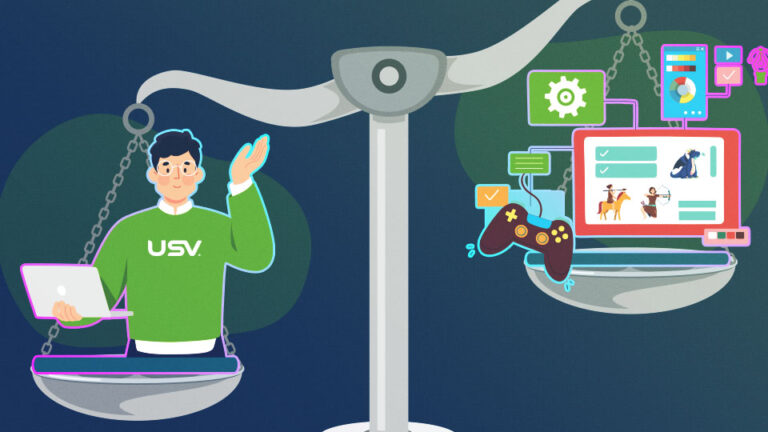Even experienced business leaders often lump innovators and entrepreneurs together and speak of them interchangeably, but there are important differences. In fact, these are actually two different types of people with different mindsets, but you can be both if you have the right attitude and education.
Entrepreneur vs Innovator
A successful business is usually based on an innovation and built by an entrepreneur. Innovators create new products, services, or ways of doing things while entrepreneurs turn those ideas into viable businesses concepts. If you believe you have developed a better way of providing a service to a client, for example, then you’re innovating. If you also have business know-how, don’t mind taking a few risks and can formulate a business plan around that idea, you’re an entrepreneur as well.
Often, however, innovators don’t like taking the risks necessary for success and find a business partner to help them bring their ideas to the marketplace. In other cases, innovators become entrepreneurs out of necessity. If you have a strong desire to see your innovation brought to consumers and can’t find someone to help you advance your ideas to marketable concepts, you can learn entrepreneurial skills and move forward with creating a business yourself.
Let’s look deeper at the characteristics of innovators and entrepreneurs and how they create success. Then, we can discuss how to develop and enhance these skills.
What is an Innovator?
An innovator is someone who comes up with a better way of doing something. This type of creative person doesn’t necessarily make a new product to sell, but they might. More often, an innovator offers an improvement to an existing product or service. This could be a new model for how something is purchased, delivered to the consumer, or serviced. It might be an improved process that allows something to be provided at a lower price, in a shorter time frame or without having to be installed.
Innovation is a business term for creativity and involves finding different ways of thinking about problems in the marketplace that may have existed for a long time. An innovator can develop something from nothing at all, creating an entirely new product or service category. They may also alter or add value to an existing marketplace offering by leveraging their unique consumer knowledge, an advanced understanding of technology or the realization that times have changed but a certain product or service category hasn’t.
Innovators who aren’t connected with an established company may have a problem, however. As creative people, they are less likely to take the risks involved with turning an idea into something that will sell. At a company, innovators help provide a competitive advantage by keeping things fresh, new, and dynamic. On their own, however, an innovator’s ideas can flounder if they don’t have the motivation to bring it forward or find someone else who can.
Successful innovators often have these positive attributes:
Innovators are always paying attention. They question established ideas, continuously reflect, always scan the world around them for information and routinely see new ways of doing things. They may find the world frustrating because so many things are done inefficiently or incompletely.
Innovators think abstractly first. While most people may forget about their ideas that seem impractical, innovators think abstractly without worrying about how to make something happen. This provides the freedom for them to develop ideas fully before dealing with the practicalities of making innovations a reality.
An innovator experiments. One good idea may be the result of dozens of bad ones. Innovators are resilient and don’t mind trying out concepts to see if they can make them work, whether it’s a new way of talking about an old idea or a new kind of service that no one else has thought of yet.
Innovators see opportunities. Where some people see dead ends, innovators see possibilities for doing things differently. They may see opportunities everywhere they look and imagine several routes to reaching any goal, meaning their minds are often crowded with ideas and rarely quiet.
What is an Entrepreneur?
An innovator may or may not have any understanding of how business works, but an entrepreneur is someone acquainted with business, who takes good ideas and turns them into great businesses. While the level of risk that an entrepreneur is willing to accept varies by person, financing and industry, entrepreneurs know that new product or service development is always risky. With their skills, however, innovative concepts can become tangible realities that make money for everyone involved.
Entrepreneurial skills include decision-making, planning, leadership, management, dedication, and motivation, to name a few. In many cases, entrepreneurs don’t limit themselves to one project or business because their drive to bring new things to the marketplace never stops. Once they achieve success, they may hand off the operation of a business to a team of employees or sell the business so they can move on to another concept.
The primary skill of many entrepreneurs is turning an idea into a tangible product or valuable service, no matter how vague the details of the innovation. They may bring in ideas from outside sources to help make something that has been created in their mind or the mind of an innovator into a marketable reality. This could involve significant changes to the original idea, but the entrepreneur’s goal is always to make money for themselves, and possibly for others, from the innovation.
Successful entrepreneurs often have these useful qualities:
Entrepreneurs are resolute. Once an entrepreneur chooses to take on a project, they usually won’t let go of it. They are resolute in their desire for success, motivated to make a profit and passionate about seeing the concept succeed, if for no other reason than as proof of their entrepreneurial skills.
Entrepreneurs are disciplined. There is usually no one looking over the shoulder of an entrepreneur, so little will get done if they aren’t disciplined enough to work hard. Their money, reputation, and ability to continue being an entrepreneur depend on their self-motivated discipline to get things done.
Entrepreneurs are natural risk-takers. While some entrepreneurs learn to accept risk as a part of creating businesses from scratch, the most successful have a natural desire or need to take risks. Uncertainty and potential failure are part of the entrepreneurial life, and enjoying risk makes it a lot easier to accept.
Working Together Every Day
Innovation and entrepreneurship aren’t things that happen for a successful business only once, and they aren’t necessarily separate things. These two concepts are related and interact to help successful businesses get established and flourish. No organization can be successful without a visionary innovator and a bold entrepreneur, which may or may not be the same person.
While some people mistakenly consider innovation necessary only for the initial formation of a company, it’s something that must keep happening for an organization to continually succeed as the marketplace changes. Similarly, the entrepreneurial spirit on which a business is founded must resurface when changes in the world make it necessary for a business to reinvent itself.
Whether that company is a multimillion-dollar Wall Street firm or a personal services business on a small-town side street, innovation and entrepreneurship work together every day.
How Can I Become an Innovative Entrepreneur?
No one is born knowing how to create a successful startup or handle the daily operations of a business. For those with a desire to innovate or bring new concepts to reality, education can mean the difference between success and failure. For success, you need to understand the basic concepts behind entrepreneurship and innovation, and there are educational settings where that can happen.
When you study these concepts in an environment that’s right for you, your raw skills and untamed talent can turn into viable skills that will serve you well. This formal education will allow you to get your business or perhaps multiple businesses started on the right foot without the conceptual flaws that could sink them. You can also use education to validate your business idea by understanding the framework through which consumers will view your services or products and understanding what types of businesses have succeeded and failed in the past.
Honing your abilities may also involve learning complementary skills that help you understand business in general and your industry specifically. You may benefit from learning strategic thinking skills, financial literacy and how to gracefully accept criticism and other feedback. When you know these things, it can increase your feeling of confidence too.
Additionally, it may help your journey to learn about business and entrepreneurial theory. While there’s a lot to be said for practical expertise and advice from experts, many past successes are based on established theories about how people’s minds work, how ideas form and how the sales process happens.
You’re Not Alone
As you learn about innovators and entrepreneurs, you can benefit from the lessons of successful innovators and entrepreneurs, either through books, articles, and websites or through personal interaction. Others who are innovating and building businesses today can form part of your network and support system, things that most people find essential for business success. Surrounding yourself with like-minded people who are in the same position as you or already achieving their success, means you always have guidance and a shoulder to cry on when things aren’t going as expected.
You can find people who will support your innovation and entrepreneurial journey at local small business clubs, networking events and many other places. Educational institutions often provide networking resources as part of their training as well.
Final Thoughts
Becoming an innovator or an entrepreneur isn’t limited to one type of person. That means there’s room for you in either or both camps. No matter your gender, race, age, socioeconomic status, or any other identifier, you can create business success. There are people, resources and programs that can provide the level of support you need to dream your biggest dreams and make them come true.
Want to Learn More?
Ready to get a Master of Arts in Entrepreneurship and Innovation degree at University of Silicon Valley? Home to a who’s who of high-tech powerhouses—including Apple, Cisco, Facebook, and Google—Silicon Valley boasts extraordinary achievements in innovation and entrepreneurship. The culture has fueled the growth of over 135,000 start-ups and has also informed the development of our one-year Master of Arts in Entrepreneurship and Innovation degree.
The Master of Arts in Entrepreneurship and Innovation degree program is designed for graduate students seeking to establish their own business ventures, manage entrepreneurial enterprises, transition to new careers, or thrive through innovation within their current place of work and can be completed in as little as 12 months. It provides an excellent way to earn your Master of Arts in Entrepreneurship and Innovation degree with minimal impact to your professional or personal life.
University of Silicon Valley is uniquely poised to offer a meaningful and valuable education for 21st century students. We believe in an education that directly correlates with the work you’ll be doing after you graduate. Interested in learning more? Contact Us today.


